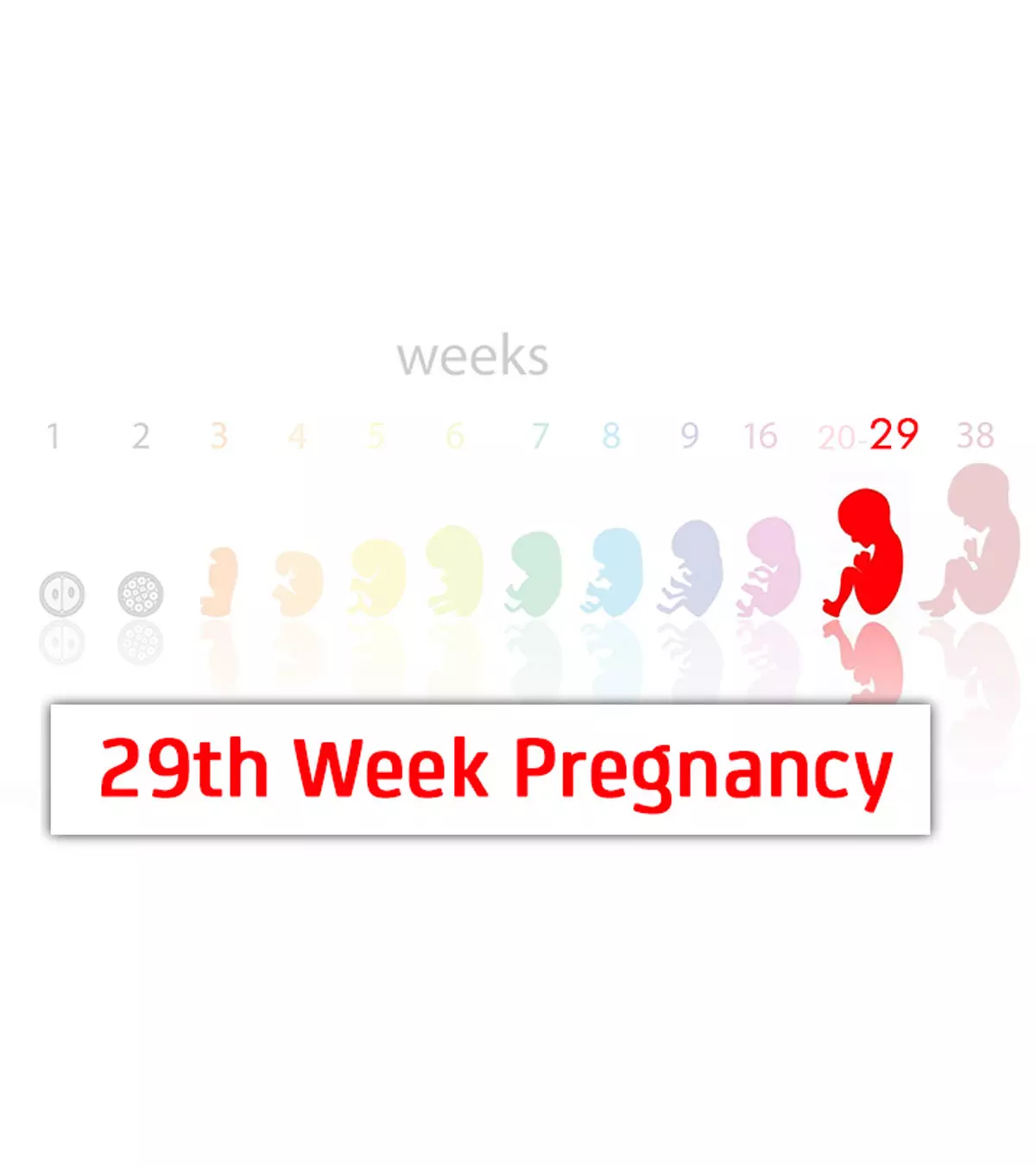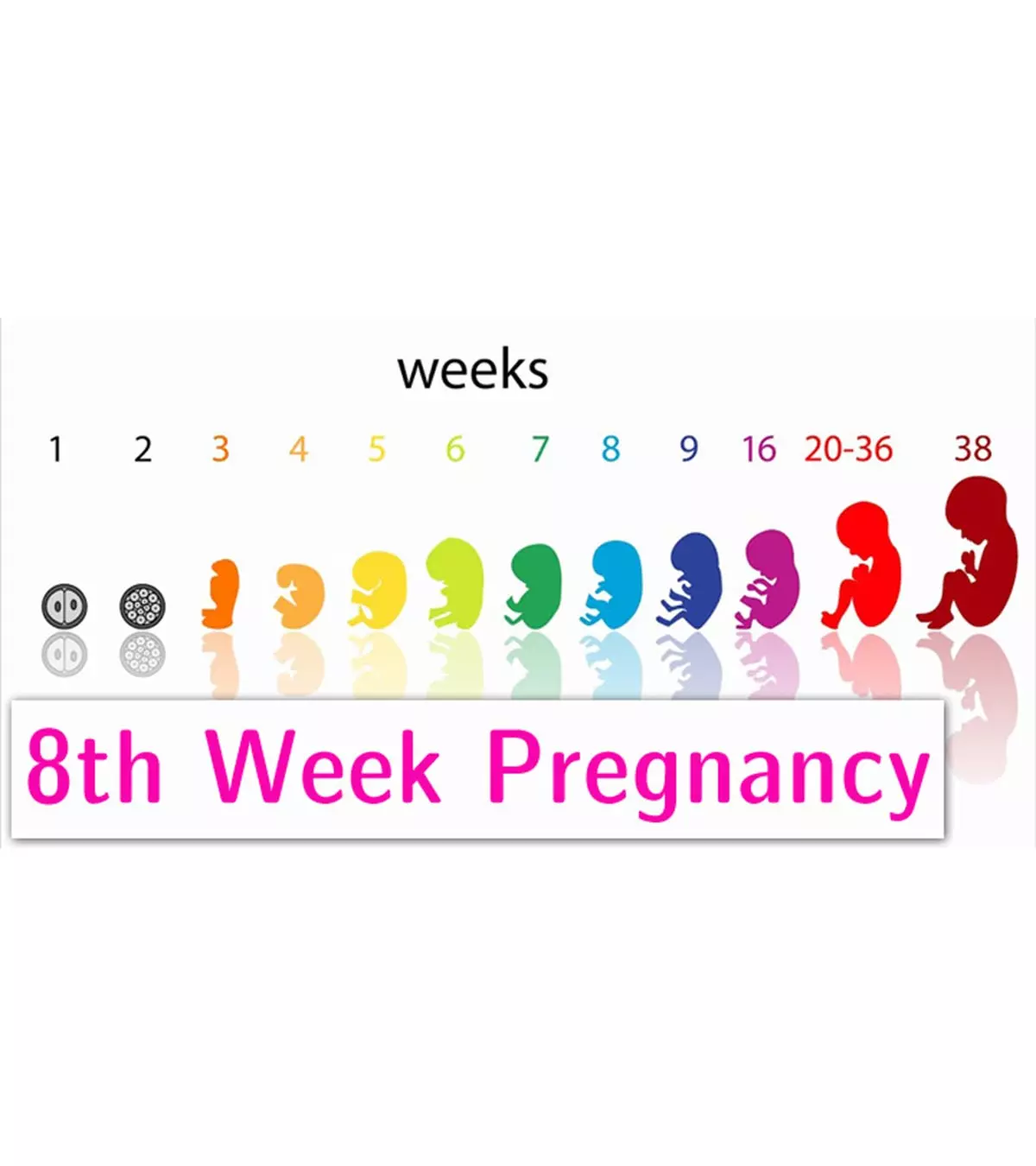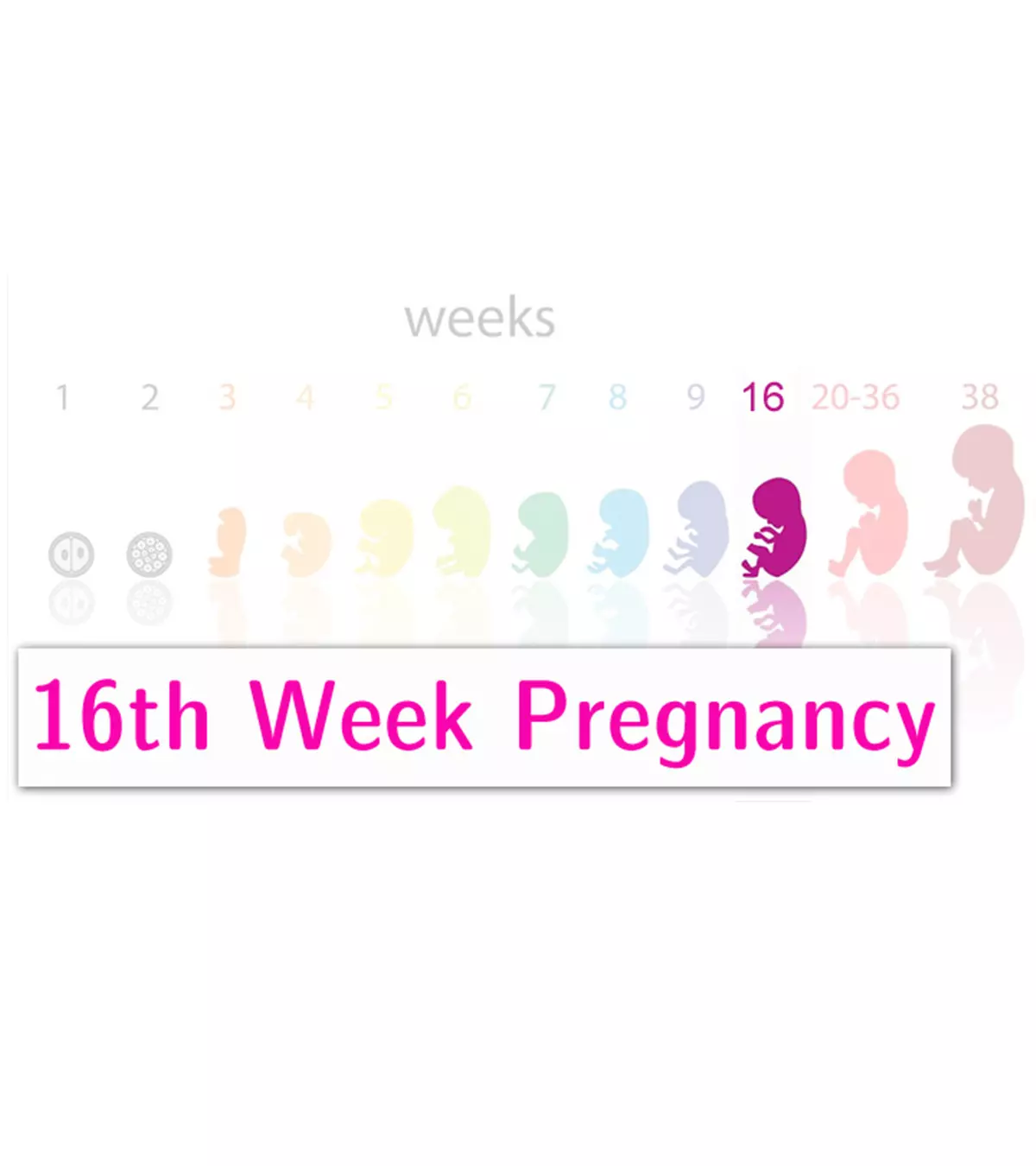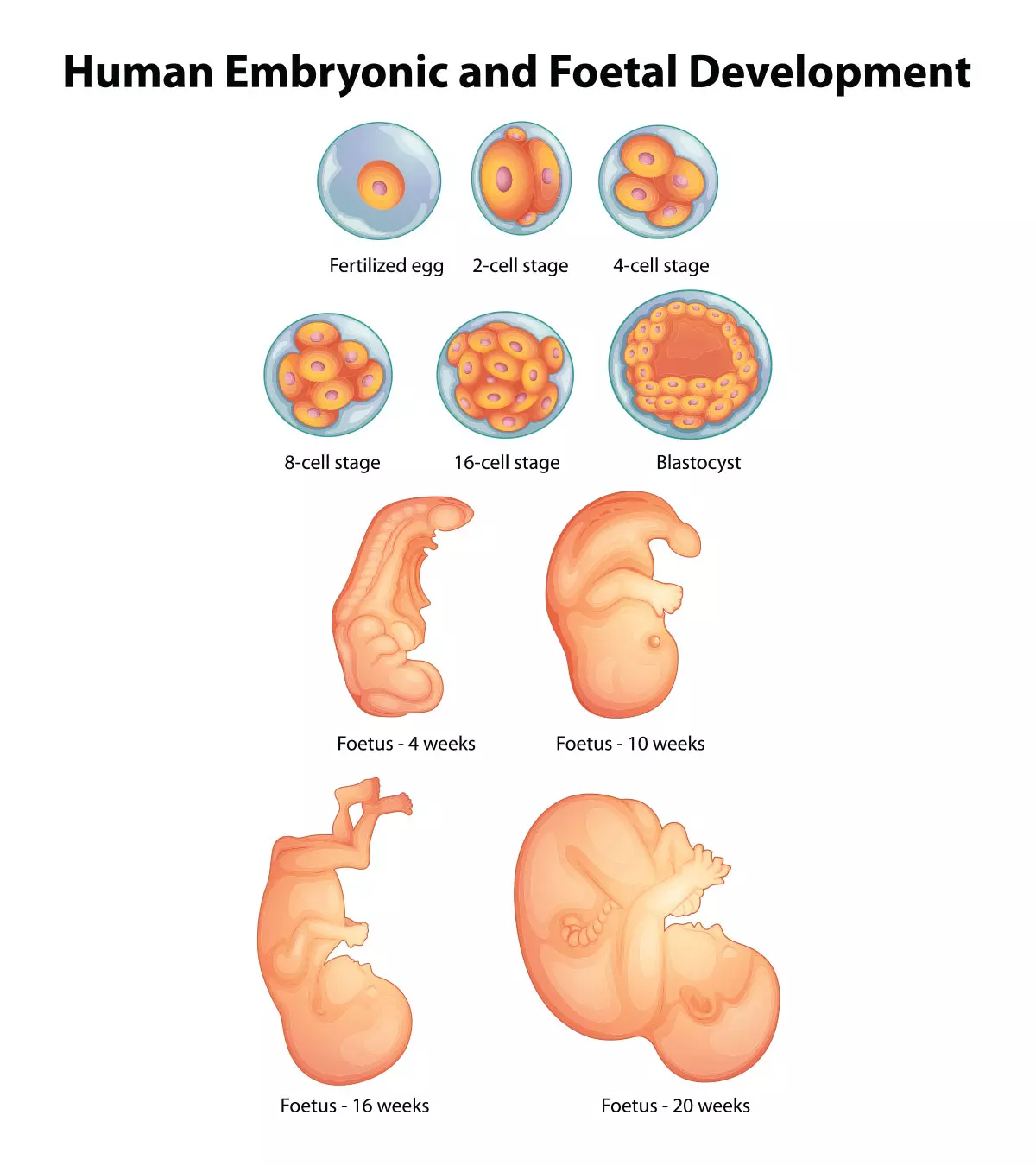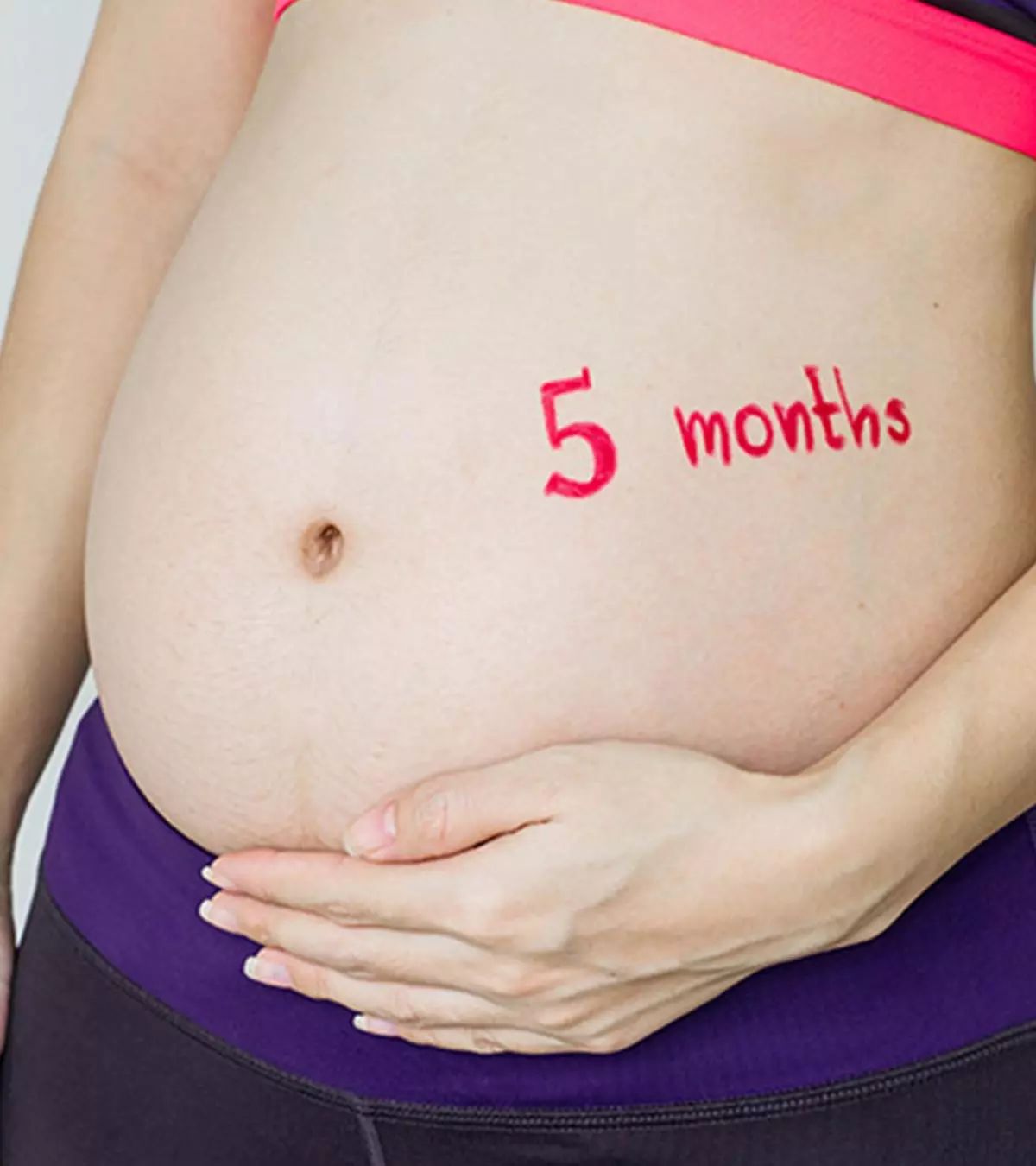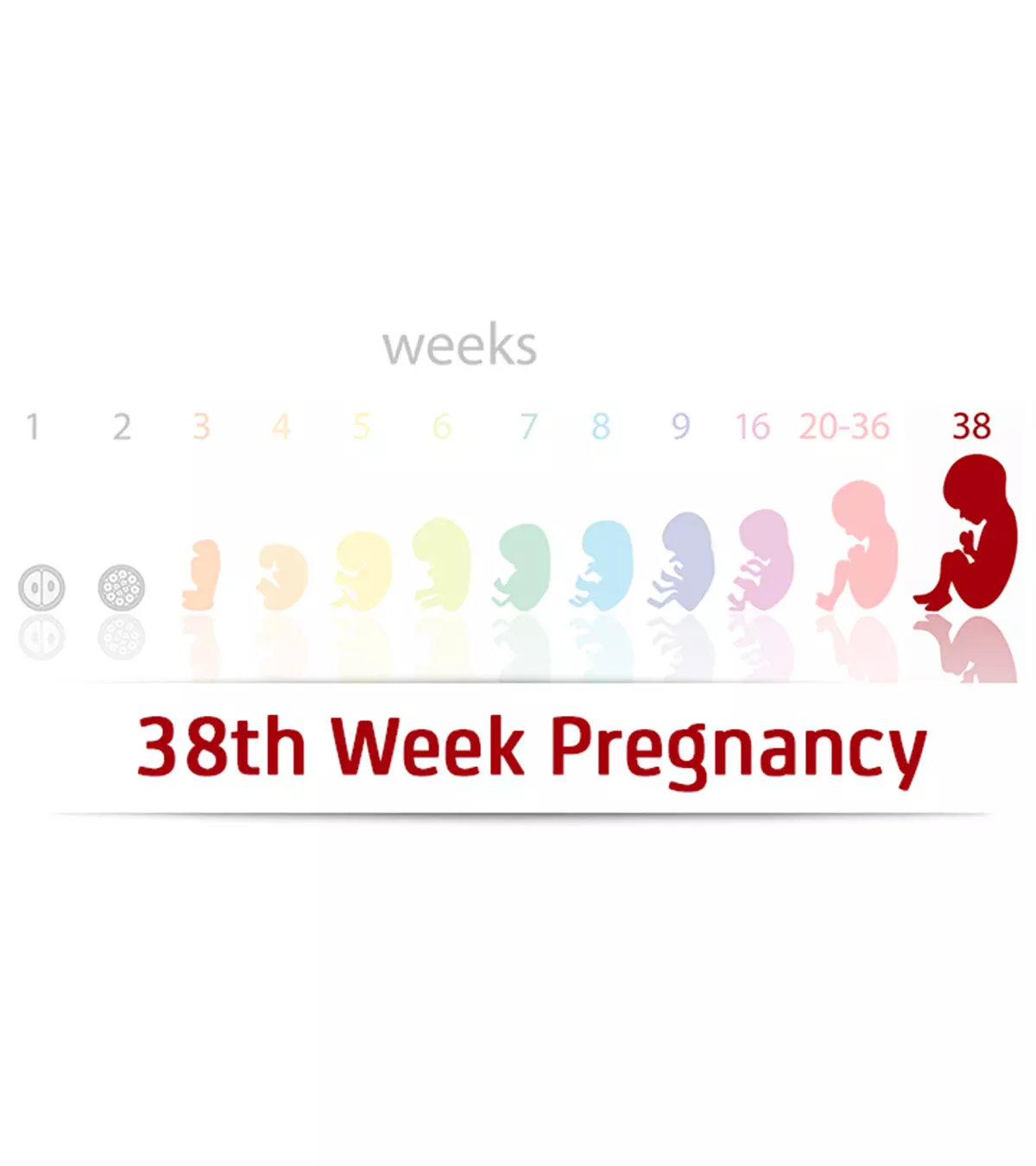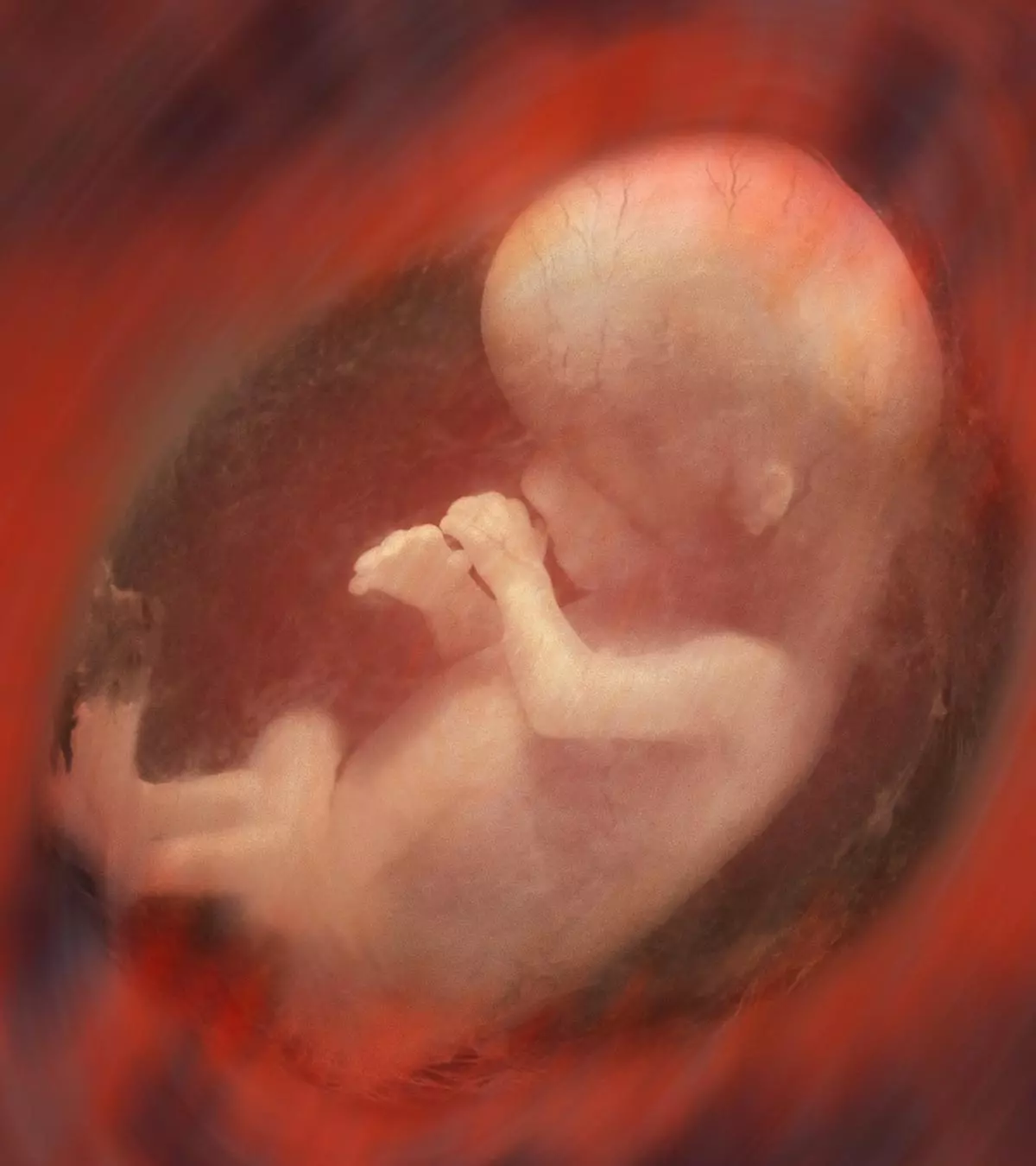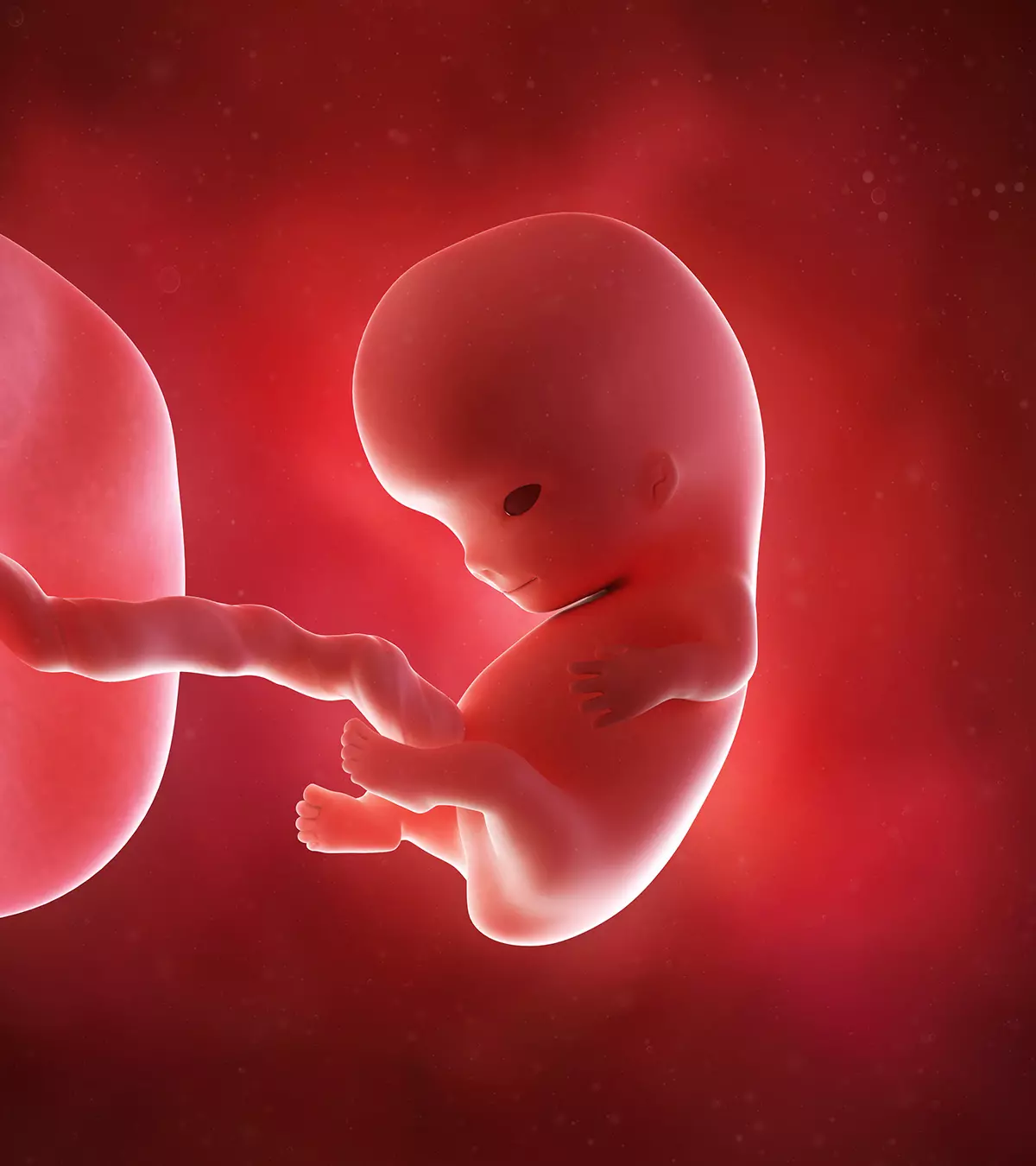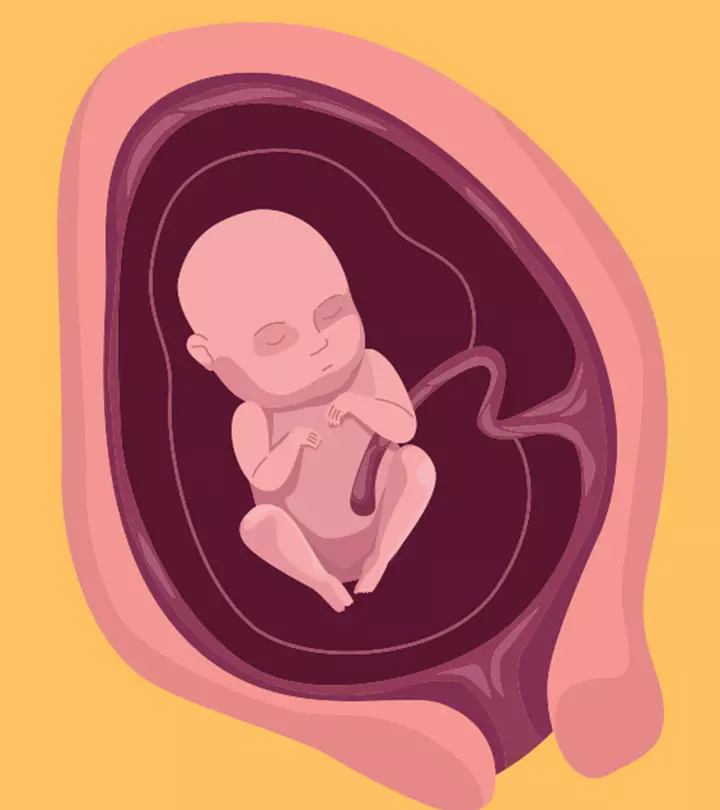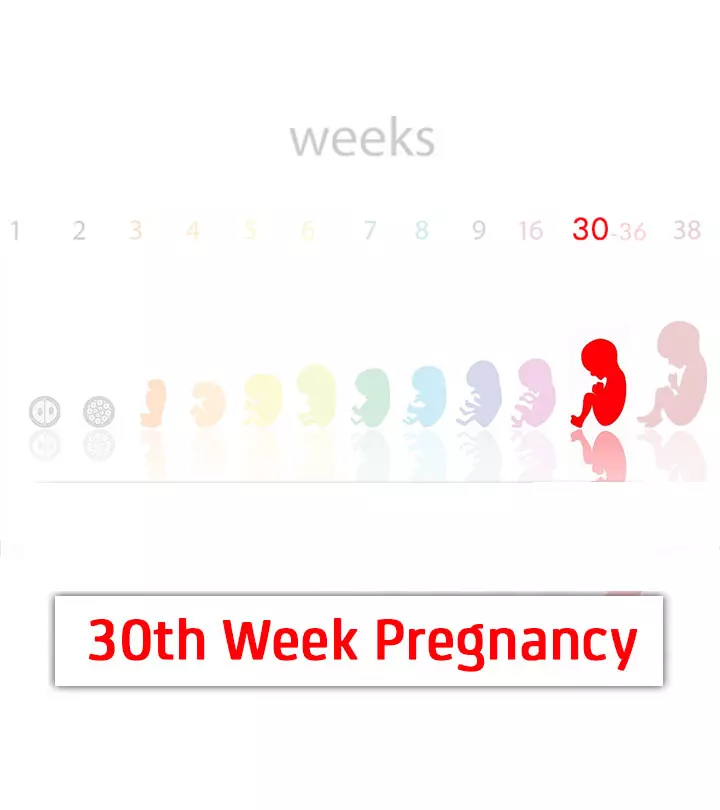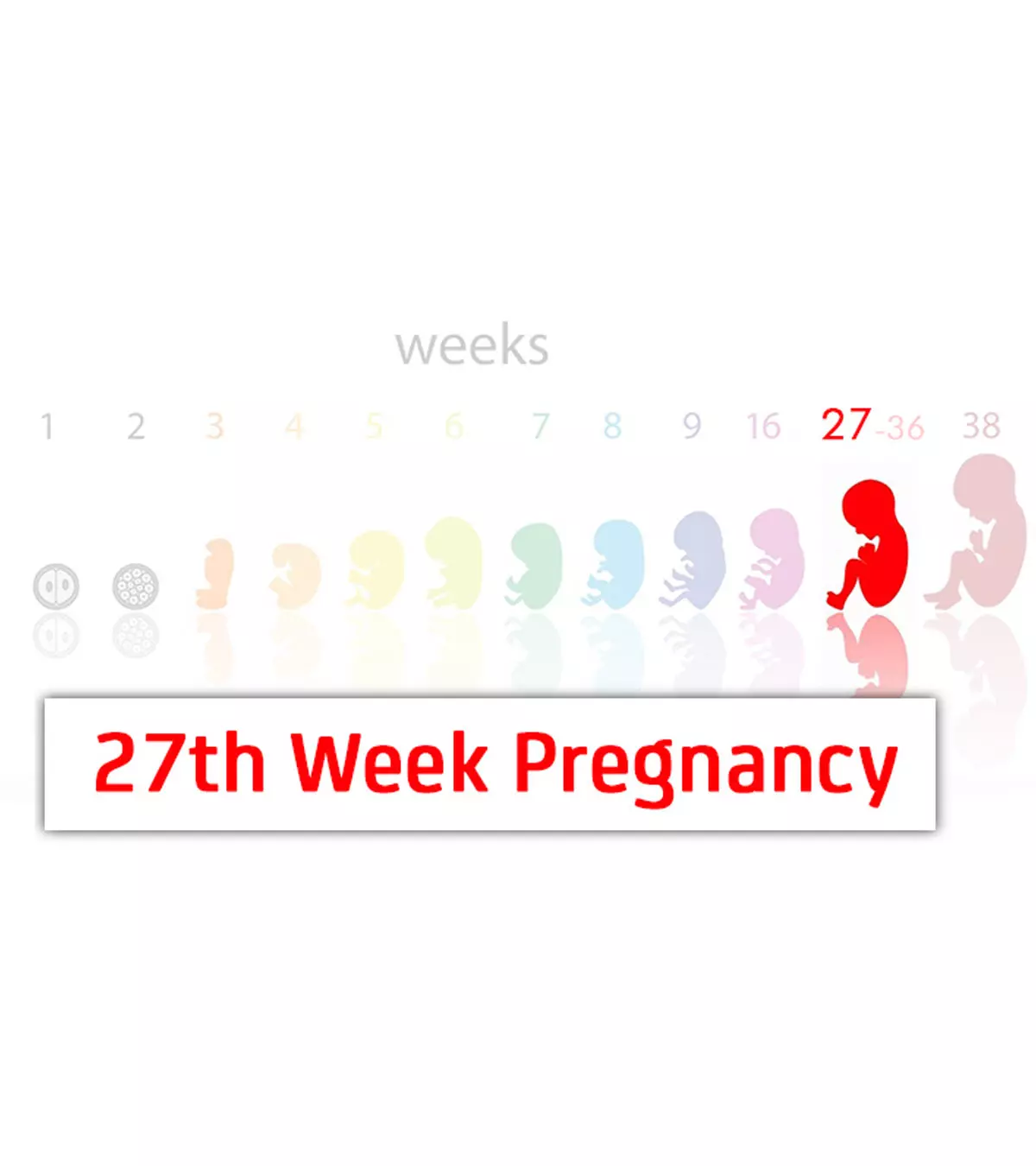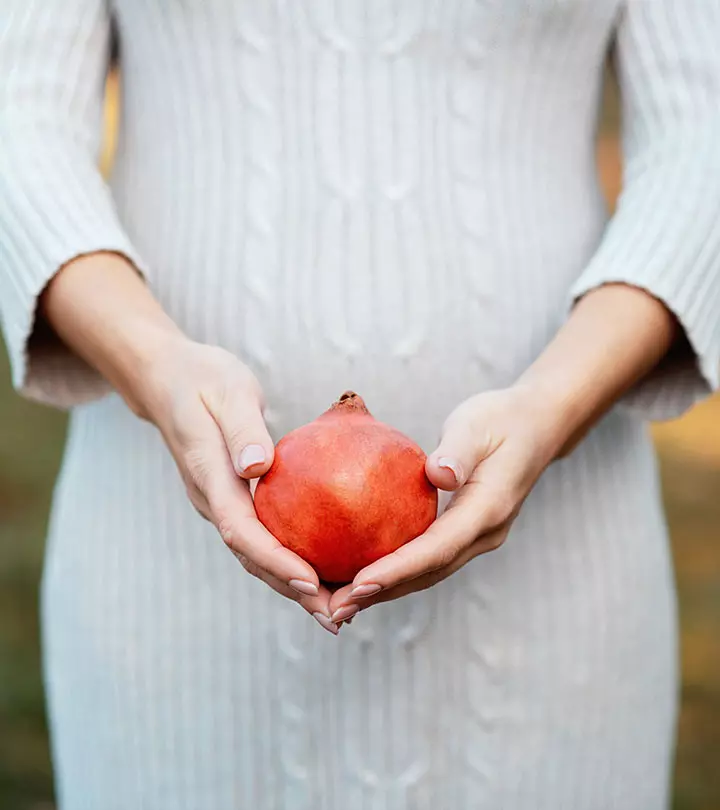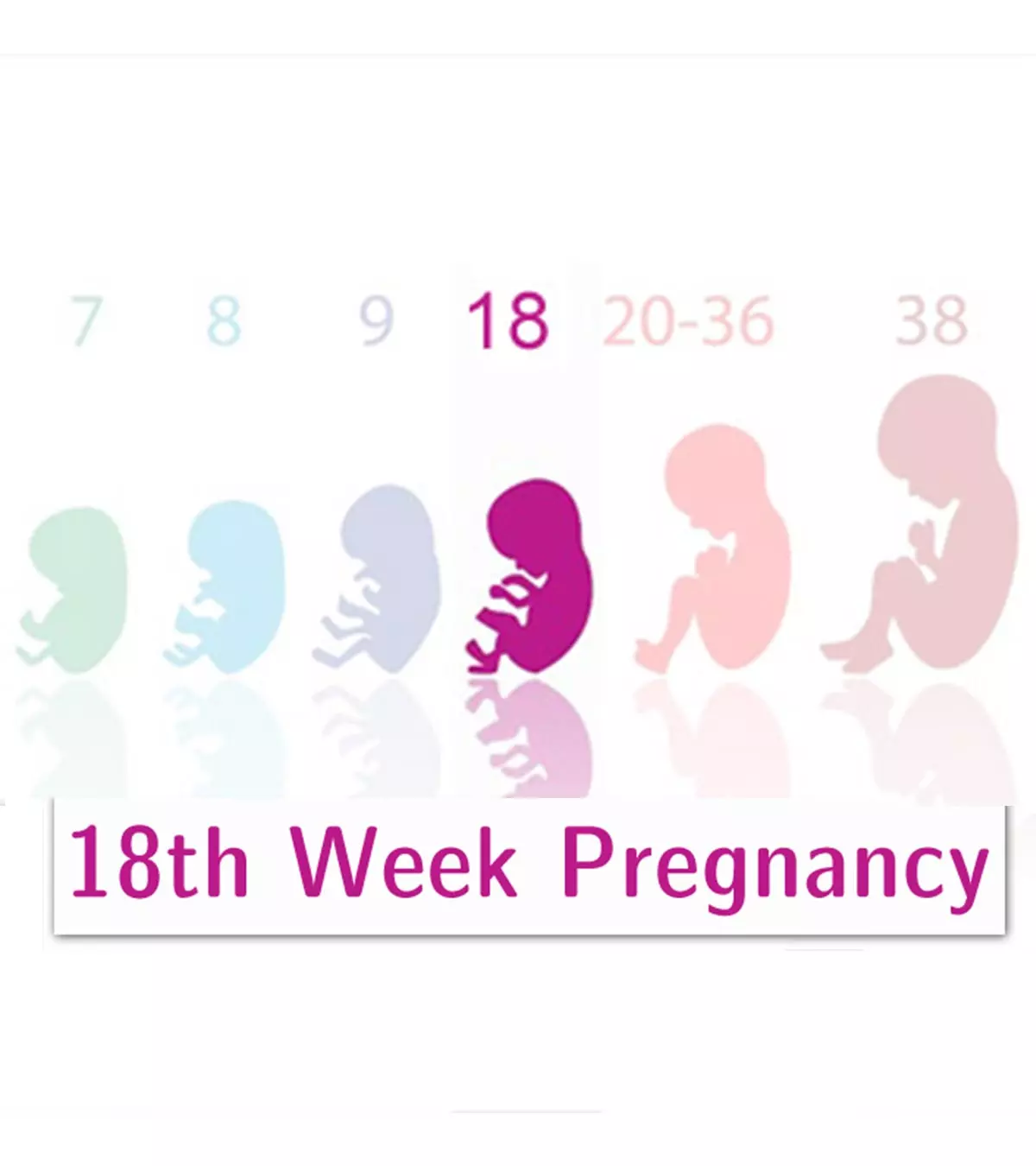
Image: MomJunction Design Team

Key Pointers
- At 18 weeks, a woman is in her second trimester, and her baby is approximately 5.6 inches long and weighs around 190g.
- The first fetal movements typically occur between 18 to 20 weeks.
- The fetal organs, including the skin, ears, eyes, bones, nerves, lungs, digestive system, and genitals, are rapidly developing.
- Common symptoms of pregnancy at this stage include weight gain, constipation, leg cramps, and back pain.
- If a woman experiences fever, extreme pelvic discomfort, severe vomiting, or dizziness during this week of pregnancy, she should seek medical attention.
How Many Months Pregnant Are You At 18 Weeks?
At 18 weeks, you are in the second trimester and four-and-a-half months pregnant. Your energy levels can be slightly higher now, and you may start to feel your baby’s first moves.
Here, MomJunction explains more about fetal development and the changes that you experience in this week.
How Big Is The Baby At 18 Weeks?
At 18 weeks, babies are as big as a bell pepper and usually measure around 5.6in (14.2cm) in length and weigh around 6.7oz (190g) (1).
Your baby’s growth continues with the development of different parts of the body.
Baby’s Development At 18 Weeks
Here is how the baby’s body is developing in this week:
| Body parts | Developmental stage |
|---|---|
| Skin | Is wrinkled and coated with a waxy substance called vernix. Fine hair called lanugo is also visible. |
| Ear | Bones of the middle ear and nerve endings from the brain are developing, so your baby might begin hearing (2). |
| Eyes | The retina is developing. It can respond to a beam of light. |
| Bones | Begin to harden in the clavicles and legs. |
| Nerves | Gets covered with a tissue coating called myelin (3). |
| Fingers | Unique fingerprints are formed. |
| Lungs | Breathing passages are being developed to form the bronchial tree (4). |
| Nails | Finger and toenails are developed to the tip (5). |
| Mouth | Swallowing and sucking movements start. Some babies can also get hiccups. |
| Liver and pancreas | Produce secretions (6). |
| Genitals | Can be seen through an ultrasound scan. |
Fetal Movement In The 18th Week Of Pregnancy
The fetal movement can usually be felt between the 18th and 20th week (7). The movements might feel like a flutter, swish, or roll. Most women may not be able to identify the baby’s movements, also called quickening, and may mistake it for gas. As the baby grows, it becomes more active, and the movements inside are more prominent.
An expectant twin mother describes her fetal movement during this week. She says, “My cute little hamsters are moving around like crazy. It is the strangest feeling, hard to explain, but the closest I can come to describing the feeling is a gas bubble that is constantly moving in the stomach. Sounds so poetic, I know. My doctor explained this as if you feel gas near the belly button, and it’s the babies moving, lower is just gas (i).”
With the baby growing and possibly moving, you will also experience certain changes in your body at this time.
 Quick fact
Quick factSymptoms You Will Experience In The 18th Week Of Pregnancy
The common pregnancy symptoms that you may experience during the 18th week are:
- Weight gain: An average weight gain of one to two pounds per week during the second trimester of pregnancy is considered safe, as recommended by the American Pregnancy Association (APA) (8). However, in case of women who have BMI less than 18.5 and greater than 24.9, the recommended weight gain rates usually range in between 0.5 to one pound.
 Did you know?
Did you know?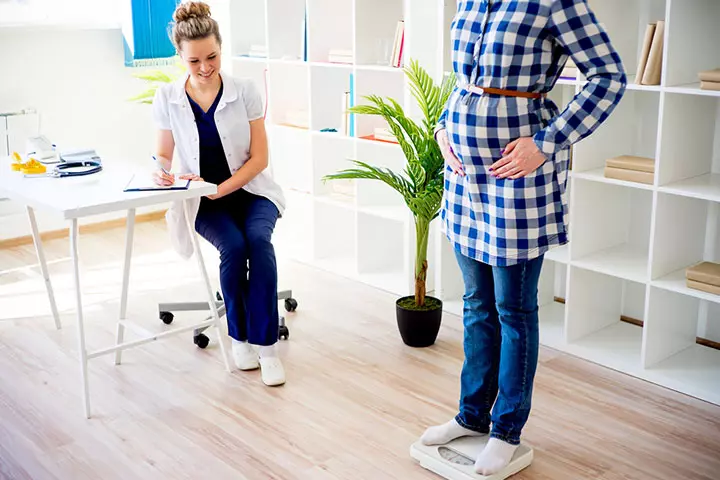
| BMI | >18.5 (underweight) | 18.5 – 24.9 (normal weight) | 25 – 29.9 (overweight) | 30 and higher (obese) |
|---|---|---|---|---|
| Weight /week | 1 ½ pound | 1 pound | ⅔ pound | ½ pound |
- Frequent urination: The growing uterus puts pressure on the bladder, which increases the frequency of urination.
- Constipation: The progesteroneiA female hormone responsible for menstruation, pregnancy, and breastfeeding hormone relaxes the muscles of the digestive tract. The food thus remains in the tract for a longer time so that maximum nutrients are absorbed into the bloodstream. Due to less movement of the intestines, constipation may occur.
- Dizziness: The increasing size of the uterus compresses the blood vessels and limits the blood flow to the brain, causing fatigue or lightheadedness. Sometimes staying hungry for a long time can also contribute to lightheadedness. Make sure that you eat properly and drink water to keep the body hydrated.
- Backache: The growing uterus shifts the body’s center of gravity, exerting pressure on the lower back, causing backache.
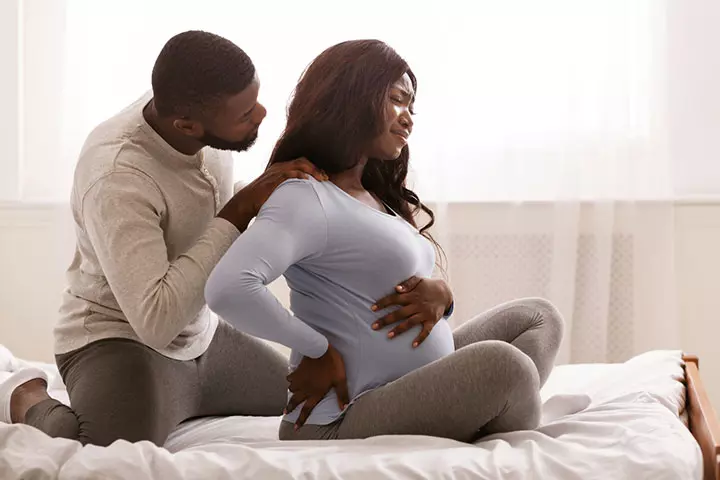
- Stuffy nose: Hormonal changes can result in more blood flow to the mucous membranes, making them swell and soften, causing stuffy nose and congestion. Increased pressure on the veins in the nostrils can lead to nosebleeds.
- Leg cramps: The growing uterus causes compression of the blood vessels leading to leg cramps, usually experienced at night.
 Point to consider
Point to consider- Heartburn: The gastric fluids are pushed upwards to the esophagus as the stomach is pushed towards the diaphragm by the growing uterus.
- Trouble sleeping: With the backaches, hip pain, and leg cramps, you may have trouble sleeping. Using a pillow around the stomach and between the legs can offer some relief.
- Edema: Water retention in the body can cause swelling of the feet and hands.
- Varicose veins: Excess blood flow to the lower part of the body leads to swelling of the nerves in your legs, also called varicose veins.
Besides these, you may also experience symptoms from earlier weeks, such as morning sickness and weird pregnancy cravings. Overall, physical and emotional changes in the body at this time give away that you are pregnant. Read about them next.
Changes In The Body At 18 Weeks

Physical changes
- Enlarged breast: The breasts become swollen and tender, as the body prepares them for breastfeeding.
- Growing belly: The tummy protrudes, and you can feel the uterus between the pubic bone and the navel.
- Linea nigra: The line, going down from the naval to the pubis, gets darker due to pigmentation.
- Stretch marks: The growing uterus stretches the skin, creating stretch marks on the belly.
- Shinier hair: Change in hormonal levels reduces hair fall. The hair looks fuller and shinier.
Emotional changes
- Mood swings, due to hormonal changes.
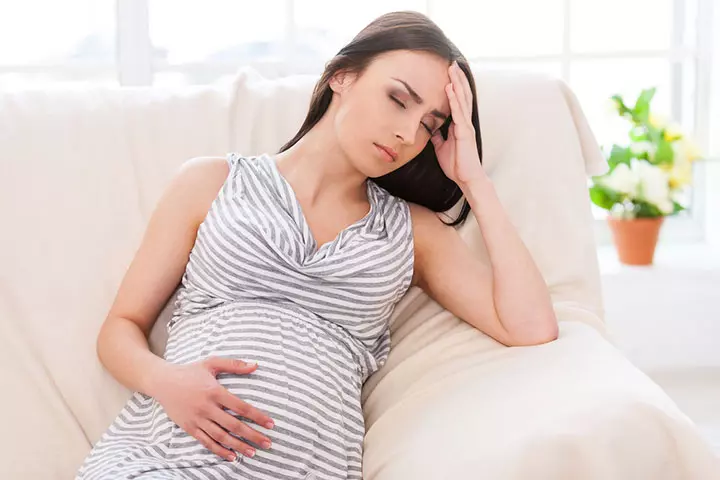
- Weird dreams, due to pregnancy-related fears and anticipations.
Sharing her pregnancy symptoms during the 18th week of her second pregnancy, Nicola, a mother of three, says, “I’m still having really crazy dreams, and I have noticed that the old pregnancy insomnia is creeping in. It’s not every night, but on the nights I am struggling to sleep, I feel like I’m awake for hours (ii).”
- Anxiety
The 18th week is more or less a safe zone for you and your baby, with few chances of a miscarriage. However, it cannot be entirely ruled out.
Exercises And Activities At 18 Weeks
Exercises and activities during the 18-week mark of pregnancy are specifically customized to accommodate the evolving needs and safety precautions of this phase. The following pointers may come in handy if you are 18 weeks pregnant (9):
- For the second trimester, it’s recommended to abstain from activities like skiing, contact sports, and karate due to their increased risk of potential falls.
- Safe exercises include walking, swimming, and moderate pre-pregnancy workouts that are low-impact and do not include the need to lift weights over 25 pounds.
- Incorporating prenatal yoga and stretching into your routine can prove highly advantageous, enhancing both strength and flexibility in preparation for childbirth.
- Always consult your healthcare provider to ensure your exercise regimen is suitable and aligned with your health profile
Is There Any Risk Of Miscarriage At 18 Weeks?
At the 18th week of pregnancy, miscarriage is rare but the chances cannot be overlooked.
- About 1 to 5% of pregnancy losses occur when a woman is 13 to 19 weeks pregnant.
- There is a 24% chance of pregnancy loss in the second trimester because of the chromosomal abnormalities such as trisomies 13, 18, and 21, sex chromosome polysomies, and monosomy X (Turner syndrome).
- Structural abnormalities also cause pregnancy loss. It may be due to the amniotic band syndromeiA congenital disorder when the fibrous bands of the amniotic sac entangle around the body parts of the developing fetus , neural tube defectsiSevere birth abnormalities of the central nervous system that develop early during pregnancy , maternal exposure to teratogensiToxic substances, fetal exposure to which may cause congenital abnormalities in the baby or uncontrolled maternal diabetes at the time of conception.
- Cervical insufficiency with painless cervical dilation, maternal history of thrombosisiFormation of one or more blood clots in the blood vessels , maternal hypertension, and physical abuse can also lead to miscarriage during the second trimester.
- Miscarriage can happen due to an infection such as bacterial vaginosis. If miscarriage occurs, you may need to stay longer in the hospital for a dilation and curettageiA procedure where the cervix is dilated and the uterine tissue is scraped with a sharp instrument for diagnosis or treatment (D&C) procedure.
Regular prenatal check-ups are essential for tracking the health of your baby and addressing any concerns early on. Your healthcare provider will guide you through what to expect during this time and offer advice on how to keep your pregnancy healthy.
Other causes of miscarriage include:
- Immunity issues
- Maternal hormonal abnormalities
- Stress
- Sexually transmitted diseases
- Erratic lifestyle
Signs Of Miscarriage At 18 Weeks
Common symptoms of a miscarriage in this week are:
- Intense pain along with cramps.
- Vaginal bleeding. The intensity of bleeding can vary for different women.
- In some cases, a miscarriage may take place without any signs and can be confirmed only during an ultrasound scan. That is called a missed miscarriage.
If you are worried that it could be a miscarriage or are feeling highly uncomfortable, go to your doctor immediately.
When To Call The Doctor
If you experience the following symptoms then make sure to call your obstetrician right away (10):
- Fever (100.4 degrees or higher)
- Pelvic pain other than cramping
- Less urination or dark colored urine
- Severe vomiting
- Feeling unconscious
- Severe headaches
- Persistent swelling in the hands or face
- Blurred vision
If there are no signs of a miscarriage, schedule a regular OB/GYN visit.
Your OB/GYN Visit
Your prenatal visit this week will include:
- Weight check
- Blood pressure
- Measure the height of the fundus
- Ultrasound scan: The second-trimester ultrasound screening, also called an anomaly scan, is done around this week. A level II sonogram may be offered to have a close look at the baby’s organ developments. It also gives information about the placental appearance and position, as well as the amount of amniotic fluid surrounding the fetus.
- Maternal serum screening (MSS test): It is a blood test done at 15 and 20 weeks +6 days. The second trimester MSS test helps in determining the risk of Down syndromeiChromosomal disorder caused by the presence of an extra copy of chromosome 21, resulting in intellectual impairment and short stature , Edward syndromeiA chromosomal condition characterized by anomalies in several body parts and delayed growth due to an extra copy of chromosome 18 and neural tube defects like spina bifidaiA congenital disorder where the spinal cord doesn't fully develop, leading to physical and neurological complications in the fetus. It is a part of triple or quad screen test used to determine the risk of abnormalities in the fetus.
- Alpha-fetoprotein test: It determines the amount of alpha-fetoproteiniA protein produced by the fetus’s liver, abnormal levels of which may indicate birth defects or genetic disorders in the mother’s blood. It is done to assess the risk of neural tube defects and chromosomal disorders in the fetus.
If everything is normal, continue following a healthy lifestyle and diet. Next, we have a few tips to help you with that.
Tips To Follow
Here are a few tips to follow for a healthy pregnancy:
- Follow a good lifestyle and eat home cooked food.
- Don’t give in to your cravings and overindulge in unhealthy foods.
- Stay hydrated.
- Eat small meals at regular intervals to manage morning sickness
- Include grains (like cereal, bread, pasta, and rice), vegetables, fruits, milk and dairy products, meat, and beans in your meal.
- Engage in moderate physical activities like walking. Staying active during pregnancy boosts your energy levels and may help ease labor.
- Quit smoking, illicit drugs, and drinking alcohol as it can affect the growth of the fetus.
- Maintain oral hygiene.
- Keep stress at bay.
- Wear loose, breathable maternity clothes that support your baby bump and comfortable slippers or shoes.
- Get enough rest.
- Do not skip your scheduled prenatal care visits and take your prenatal vitamins regularly.

- Do not take any medication without the doctor’s permission.
- Do not sit with legs crossed and avoid any faulty postures as it can cause a backache.
- Avoid fatty and oily foods to prevent heartburn.
- Consume more fiber to reduce constipation.
- If your work requires you to sit for a long time in one position, try to get up often and walk around a little every one hour.
- Spend more time with family and friends.
Also,
- Research about the best childbirth classes in your area.
- Do not miss any of the appointments with the doctor.
- Book appointment with a dentist for an oral checkup.
- Start reading pregnancy books and engage in activities that keep you happy.
Your partner can support you with these things and more. Keep reading to know how he can help you.
Tips For Dad-To-Be
Here’s what your partner can do:
- Share the responsibilities of the household chores.
- Create a pleasant environment at home.
- Accompany you to all the prenatal visits.
- Plan for maternal shopping.
- Give you a good neck and foot massage when you need one.
Frequently Asked Questions
1. Is it normal not to feel movement at 18 weeks pregnant?
Some may feel their baby move inside their belly at 18 weeks. However, this is not the norm since many factors influence this feeling, including maternal body mass index and the amount of fluid in the placenta. Further, you are less likely to experience fetal movement until 20 weeks if it is your first pregnancy (11) (12).
2. Is it normal to have pains at 18 weeks pregnant?
Abdominal pain is expected during week 18 and can be caused by constipation, gassiness, and the ligaments stretching to make room for the fetus (13).
3. Can my baby feel it when I rub my belly at 18 weeks?
Babies generally do not respond when their mother rubs their belly at 18 weeks. Hence, it is unclear whether they can feel it at this stage. However, at 26 weeks, they actively move in response to their mother’s hand over her belly (14).
During the 18th week of your pregnancy, your baby is similar to the size of bell pepper. Their bones begin to harden, and you can also feel slight baby movements. In addition, the breasts are enlarged during this period, and signs of mood swings and anxiety are often felt. You must take proper care of yourself and the fetus to rule out the possibility of miscarriage. If you have any discomfort or notice signs of vaginal bleeding or severe vomiting, consult your doctor immediately for timely treatment.
Infographic: Tips To Follow During The 18th Week Of Pregnancy
It’s essential to prioritize your health and well-being throughout pregnancy. The infographic below outlines vital points to remember during the 18th week of pregnancy. Do take a moment to review it and share it with others. The health of you and your baby is paramount, so it’s always better to be cautious. Illustration: Momjunction Design Team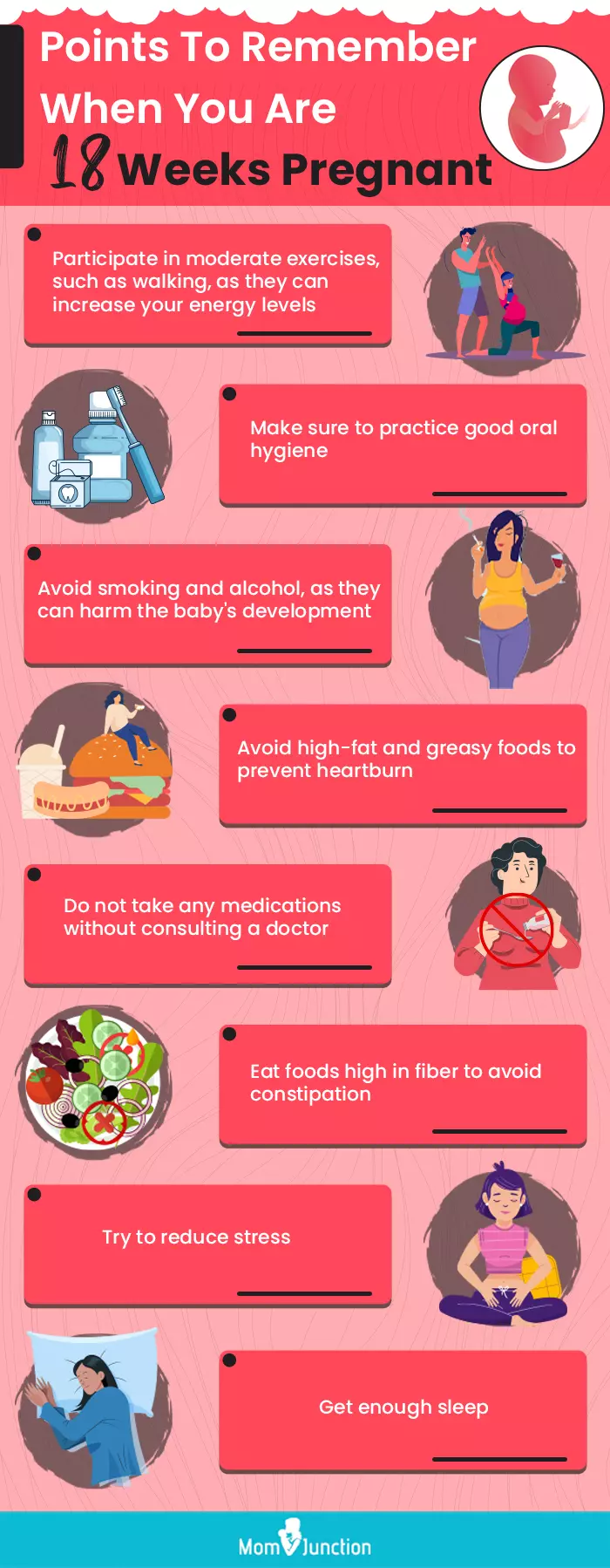
Feeling your baby move is an amazing experience! Learn about the size of your baby at 18 weeks of pregnancy and the common symptoms you may experience during this time.
Personal Experience: Source
MomJunction articles include first-hand experiences to provide you with better insights through real-life narratives. Here are the sources of personal accounts referenced in this article.
i. Week 18: vegan twin pregnancy update.
https://genkikitty.wordpress.com/2017/02/08/week-18-vegan-twin-pregnancy-update/
ii. 18 weeks pregnant – baby number 2.
https://thebradburybunch.wordpress.com/2016/06/15/18-weeks-pregnant-baby-number-2/
References
- Fetal Development.
https://embryology.med.unsw.edu.au/embryology/index.php/Fetal_Development - Week 18.
https://kidshealth.org/en/parents/week18.html - Week 18.
https://www.healthywomen.org/content/article/18-weeks-pregnant-symptoms-and-signs - Prenatal Summary.
https://www.ehd.org/prenatal-summary.php - Pregnancy Week By Week.
https://www.duedatecalculator.org/pregnancy-week-by-week/ - Fetal development.
https://medlineplus.gov/ency/article/002398.htm - Your baby’s movements in pregnancy.
https://www.rcog.org.uk/for-the-public/browse-our-patient-information/your-babys-movements-in-pregnancy/ - Pregnancy Weight Gain.
https://americanpregnancy.org/healthy-pregnancy/pregnancy-health-wellness/pregnancy-weight-gain/ - A trimester-by-trimester guide to safe exercise during pregnancy.
https://www.luminishealth.org/en/blog/a-trimester-by-trimester-guide-to-safe-exercise-during-pregnancy - Warning signs during pregnancy.
https://www.pregnancybirthbaby.org.au/warning-signs-during-pregnancy - You and your baby at 19 weeks pregnant.
https://www.nhs.uk/pregnancy/week-by-week/13-to-27/19-weeks/ - Feeling your baby move during pregnancy.
https://utswmed.org/medblog/fetal-movements/ - You and your baby at 18 weeks pregnant.
https://www.nhs.uk/pregnancy/week-by-week/13-to-27/18-weeks/ - Bonding with your baby during pregnancy.
https://pregnancyafterlosssupport.org/baby-hiccups-in-the-womb-what-is-normal/ - Baby Hiccups in the Womb: What Is Normal?
https://www.pregnancybirthbaby.org.au/bonding-with-your-baby-during-pregnancy - Weight Gain With Twins.
https://americanpregnancy.org/healthy-pregnancy/multiples/weight-gain-with-multiples/
Community Experiences
Join the conversation and become a part of our nurturing community! Share your stories, experiences, and insights to connect with fellow parents.
Read full bio of Dr. Richa Hatila Singh
Read full bio of Sakshi Mishra
Read full bio of Rebecca Malachi
Read full bio of Aneesha Amonz





